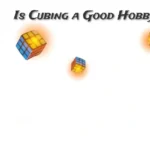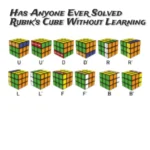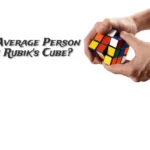In recent years, a seemingly simple yet intricate hobby has captured the minds and fingers of enthusiasts worldwide – cubing. Defined by its primary tool, the Rubik’s Cube, cubing has evolved from a casual pastime to a competitive sport, challenging individuals to solve the multicolored puzzle in record times. In this article, we’ll explore the question: Is cubing a good hobby? From cognitive benefits to social aspects and accessibility, we’ll delve into the various facets that make cubing a unique and potentially rewarding pursuit.
Benefits of Having Cubing as A Hobby
Cognitive Benefits
Cubing is more than just a visually stimulating activity. It engages the mind in ways that can have lasting cognitive benefits.
- Improved Memory and Concentration:
Solving a Rubik’s Cube requires a keen memory and intense concentration. As cubers memorize algorithms and patterns, they exercise their brain’s capacity for retention and focus. - Development of Problem-Solving Skills:
The Rubik’s Cube presents a complex problem that demands strategic thinking and problem-solving skills. Cubing enthusiasts often find that these skills translate into improved decision-making and analytical abilities in other aspects of life.
Motor Skills Enhancement
Beyond mental gymnastics, cubing contributes to developing and refining motor skills.
- Hand-Eye Coordination Improvement:
Manipulating the cube’s various layers involves precise hand movements. Over time, cubers experience a noticeable enhancement in hand-eye coordination, a skill with applications in many areas of life. - Fine Motor Skills Development:
The delicate turns and twists required to solve a Rubik’s Cube hone fine motor skills. This can be particularly beneficial for individuals of all ages, including children in the early stages of motor skill development.
Social and Competitive Aspects
Community Engagement
One of the unexpected delights of cubing lies in its ability to foster a sense of community among enthusiasts.
- Local and Online Cubing Communities:
Cubers often find like-minded individuals in their local communities, organizing meet-ups and sharing tips. The rise of online platforms has further connected cubers globally, creating a supportive network for beginners and experienced solvers alike. - Collaboration and Shared Experiences:
Cubing is not just a solitary endeavor. Collaborative solving sessions and group challenges are common among cubing communities. Shared experiences create lasting bonds, making cubing more than a mere hobby; it becomes a social outlet.
Competitive Opportunities
For those seeking an extra layer of excitement, cubing extends beyond personal challenges to competitive opportunities.
- Participating in Cubing Competitions:
Cubing competitions have proliferated, offering a platform for enthusiasts to showcase their skills. From local events to international championships, cubers can compete against peers, fostering a spirit of healthy competition and personal growth. - Setting Personal Goals and Achievements:
Even without formal competitions, cubing allows individuals to set personal goals and celebrate achievements. Whether it’s achieving a faster solve time or mastering advanced techniques, the sense of accomplishment can be a powerful motivator.
Accessibility and Cost
Cubing is renowned for its accessibility, both in terms of learning resources and the affordability of the primary tool—the Rubik’s Cube.
Affordability of Cubes
- Diverse Range of Cubes:
The world of cubing offers a variety of cubes beyond the classic 3×3 Rubik’s Cube. From different sizes to variations in complexity, enthusiasts can choose cubes that align with their preferences and skill levels. - Economic Accessibility:
Unlike some hobbies that require substantial financial investments, cubing is relatively economical. Entry-level cubes are affordable, making it accessible to individuals of various economic backgrounds.
Online Resources for Learning and Practicing
- Tutorials and Guides:
The internet is a treasure trove of cubing tutorials and guides. From YouTube videos to dedicated websites, aspiring cubers can access a wealth of information to learn solving techniques and improve their skills. - Online Cubing Simulators:
For those without a physical cube, online simulators offer a virtual platform to practice solving. This eliminates barriers related to cube availability and ensures that anyone with an internet connection can engage in cubing.
Challenges in Having Cubing as A Hobby
While cubing boasts numerous benefits and positive aspects, it’s essential to acknowledge the potential challenges and criticisms associated with this hobby.
Time Commitment
- Balancing Cubing with Other Activities:
One challenge cubers may face is finding a balance between cubing and other aspects of life. As the hobby requires practice and dedication, individuals must manage their time effectively to avoid neglecting other responsibilities and interests. - Potential for Obsession:
Like any engaging pursuit, there is a risk of obsession. Some individuals may become overly consumed by cubing, leading to neglect of other important areas of life. It’s crucial for enthusiasts to maintain a healthy perspective and avoid letting cubing dominate their entire existence.
Stereotypes and Misconceptions about Cubing
- Perceived as Solitary and Introverted:
Cubing is sometimes unfairly stereotyped as a solitary and introverted activity. While it can be enjoyed individually, the thriving cubing communities and social aspects often challenge this misconception. - Dismissed as a “Geeky” Pursuit:
Some may dismiss cubing as a niche or “geeky” hobby. However, the cognitive benefits, social interactions, and competitive elements demonstrate that cubing transcends stereotypes and appeals to diverse individuals.
Personal Experiences
To gain a deeper understanding of the impact of cubing, it’s valuable to explore personal experiences and testimonials from individuals who have embraced this unique hobby.
Testimonials from Cubers
- Personal Growth and Confidence:
Many cubers attest to personal growth and increased confidence as they conquer the challenges the Rubik’s Cube poses. The journey of mastering algorithms and improving solve times contributes to a sense of accomplishment. - Community Support and Friendships:
Testimonials often highlight the supportive nature of the cubing community. Friendships forged through shared passion provide encouragement, motivation, and a sense of belonging.
Varied Perspectives on the Impact of Cubing on Individuals’ Lives
- Academic and Professional Success:
Some individuals credit their cubing skills for improved concentration, problem-solving abilities, and academic success. These skills can also translate into professional settings, enhancing productivity and creativity. - Stress Relief and Relaxation:
For others, cubing serves as a therapeutic outlet, offering a break from the demands of daily life. The repetitive motions and focus required for solving can provide a meditative experience, reducing stress and promoting relaxation.
Conclusion:
In conclusion, cubing emerges as a dynamic and multifaceted hobby, offering cognitive benefits, social connections, and competitive excitement. Its accessibility and affordability make it an inclusive pursuit, while personal testimonials highlight its positive impact on individuals’ lives. Despite potential challenges, the diverse perspectives and varied experiences underscore the richness of the cubing journey. Encouraging readers to explore this unique hobby, the key lies in finding a balance that aligns with personal interests and goals. So, grab a cube, embrace the challenge, and discover the vibrant world of cubing!




